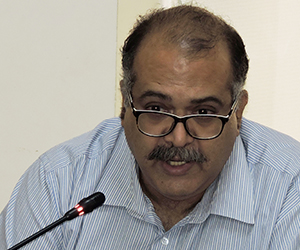With the US drawdown (perhaps even complete withdrawal) from Afghanistan looming large over the horizon, there is growing pessimism (a lot of it unwarranted) over the prospect of the Afghan state’s ability to survive without the crutches of foreign security forces. Clearly, the impact of any collapse of the Afghan state as a result of ceaseless onslaughts by Islamist radicals (the Taliban/Al Qaeda combine) will not remain limited to Afghanistan. If anything, a destabilised Afghanistan will severely destabilise the entire region. Countries like India and Pakistan are very likely to be buffeted by developments in Afghanistan. This is one of the main reasons that has given rise to talk among academics, think-tanks and policy wonks about the two countries which most fear the fallout of Afghanistan descending into chaos working together to ensure that such a catastrophe doesn’t occur. While on a theoretical plane such cooperation between India and Pakistan might sound like a great idea, on a more practical level, the possibility of such cooperation is nothing but a pipedream.
Much of what has gone wrong in Afghanistan is the result of Pakistan trying to compete with, counter and check India and to now expect it to change tack and cooperate with India at this rather late stage is quite unrealistic. Apologists for Pakistan and Western academics who discovered the Afpak region only after 9/11 often dumb down the spectre of instability in Afghanistan by attributing it to “the hostility between India and Pakistan” which according to these people “lies at the heart of the current war in Afghanistan”. Equally egregious is the peddling of the illogical theory that the road to Kabul passes through Kashmir. Obviously, the purveyors of such specious theories deliberately try to pin some, if not most, of the blame on India for Pakistan's malignant acts against Afghanistan.
By equating India’s benign and beneficial development oriented involvement in Afghanistan with Pakistan's malign and destructive interference in Afghan affairs, a disingenuous attempt is made to draw some sort of moral equivalence between India and Pakistan in Afghanistan, blithely ignoring the fact that India has no, repeat no, interest in making Afghanistan a proxy battlefield against Pakistan. The same however cannot be said for Pakistan which has not only used Islamist terror networks to target India in Afghanistan but has forged its entire Afghan policy with an eye on denying India any presence inside Afghanistan. If therefore a proxy war is being fought inside Afghanistan, it isn’t India that’s fighting it but Pakistan and to club the two countries together is nothing but a travesty.
While it is true that India has a vital interest in Afghanistan’s stability, security and independence, this interest is far transcends a desire to use Afghanistan to only poke a finger in Pakistan's eye, much less ‘encircle’ Pakistan and catch it in a ‘pincer’. If anything, India sees Afghanistan as critical for ensuring regional stability because an unstable Afghanistan will inevitably destabilise the entire region. Unlike Pakistan, India has imbibed this immutable lesson of history and is therefore committed to helping Afghanistan stabilise politically, economically and militarily. Ironically enough, this is also what is in Pakistan's interest because more than anyone else, it is Pakistan that will suffer the immediate fallout of any instability in Afghanistan. Indeed, over the last three decades, Pakistan has faced the brunt of the various wars that have been fought inside Afghanistan.
Although Pakistan publicly never tires of declaring its interest in a stable and secure Afghanistan, and professes to back an “Afghan-led, Afghan-owned and Afghan-driven” solution, behind the scenes it has done its damnedest to undermine all that it so piously declares in public. The entire ‘strategic depth’ policy remains very much in place, if not in the strict military sense (which actually never made any sense in the first place) then at least in the politico-strategic sense. Cut through the clap-trap, and it is clear that the Pakistani concept of ‘strategic depth’ is essentially reducing Afghanistan into a sort of subsidiary alliance in which the foreign and security policy of Afghanistan is decided not in Kabul but in Rawalpindi. While Pakistan is trying to replicate the British Raj’s policies in Afghanistan, India wants to see Afghanistan re-emerge as an independent nation that is sovereign in all its decisions.
It is this quest of Pakistan to make Afghanistan a vassal state that is at the root of all the troubles in the region. In its maniacal desire to call all the shots in Afghanistan, Pakistan seems to have ignored the simple reality that it wields a certain natural influence in Afghanistan which emanates from geography (trade routes etc), ethnic overlap, and to an extent, common religion. No other country in the world can ever replace this influence, which can be exercised by Pakistan in either a benign manner or a malign manner. Unfortunately for Afghanistan, Pakistan has chosen the malign way to wield influence in Afghanistan. The single most destructive example of this malign influence is the export and imposition of Taliban, which is a Pakistani and not an Afghan product. Add to this the sowing of ethnic differences by pitting the Pashtuns against other smaller ethnic, linguistic and sectarian groups. Pakistan has buttressed the ethnic divide in Afghanistan by constantly harping on the need to ensure Pashtun dominance. Despite the ethnic tug of war for influence, resources, power in Afghanistan, the Afghans have a unique sense of nationhood wherein none of the ethnic groups talk of breaking up the country. Compare this to Pakistan where the fear of balkanisation along ethnic lines has remained an abiding fear. And yet, the Pakistanis have planted this virus in Afghan minds.
For their part, the Afghans know that the tyranny of geography forces them to accept a certain amount of Pakistani influence. This the Afghans try and balance by building relations with other countries like India and Iran. Pakistan needs to learn to live with this reality because Pakistan itself has done the same thing against India through its relations with the US and China. Because of the development work inside Afghanistan and the fact that India has never done anything inimical to Afghanistan, there is enormous goodwill for India among all Afghans. Coupled with the Afghan quest to balance Pakistan, the benign image of India (including its soft power) bestows upon it a certain level of influence on Afghan polity and society. And yet, this influence doesn't outweigh or undermine the influence, both natural and coercive, that Pakistan exercises.
Rather than deal with Afghanistan with a degree of assuredness that should come with its natural influence, Pakistan has tried to impose an imperial design, which it can neither justify nor sustain politically, economically or militarily. It is quite clearly unacceptable for any self-respecting Afghan to accept Pakistani diktat on how Afghanistan should conduct its foreign policy. What role India will play in Afghanistan and how deeply it will get involved in that country is something that the Afghan government and the Indian government will decide. Pakistan cannot have a veto on what India can or cannot do.
If there ever has to be any possibility of India and Pakistan working in conjunction to stabilise Afghanistan, then this will only be possible if Pakistan junks the concept of ‘strategic depth’ and lets Afghans decide their own future. What is more, as long as Pakistan's primary objective remains denying India any presence inside Afghanistan, there cannot be any way that the two countries can cooperate on Afghanistan. For this to happen, however, Pakistan needs to get over its obsessive insecurity and hatred of India. All of this is clearly a very tall order and unlikely to happen any time soon, certainly not before the pullout of foreign forces from Afghanistan. Therefore, instead of wasting time on pipedreams about working with Pakistan, India should do whatever it can to bolster the Afghan government against the forces of fanaticism and obscurantism that once again threaten Afghanistan.
Published Date: 15th January 2014, Image source: http://globalsouthdevelopment.files.wordpress.com












Post new comment